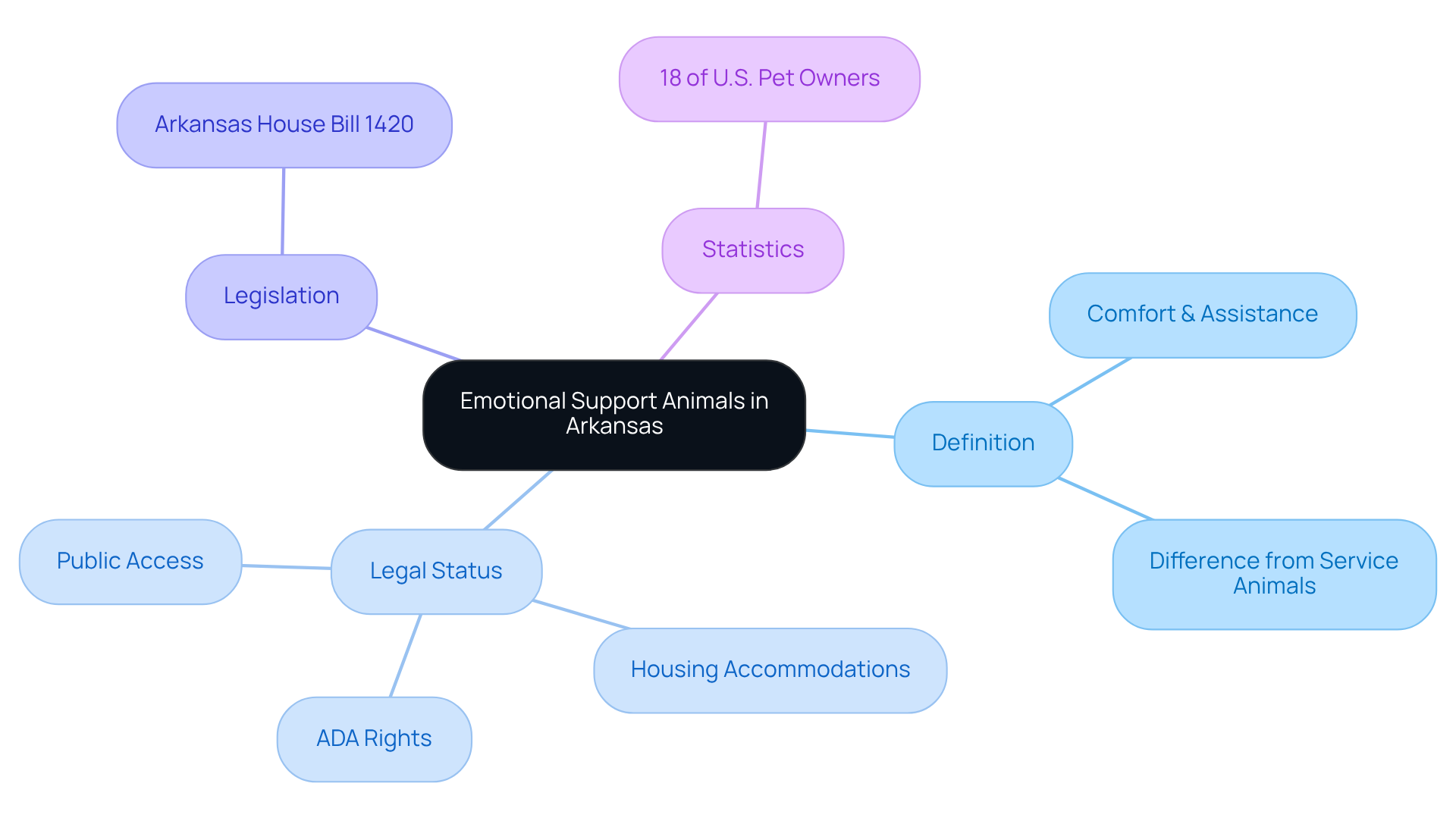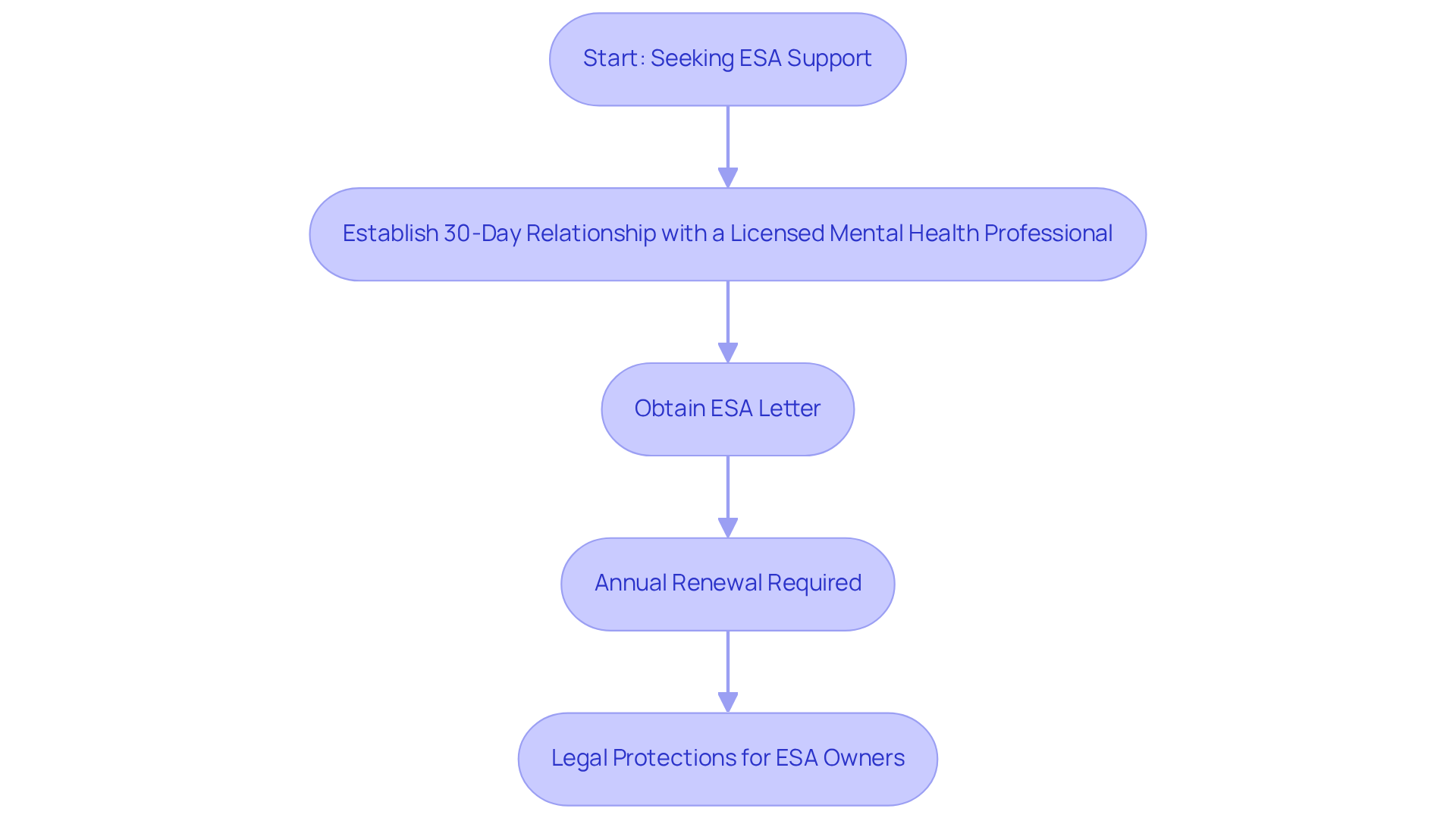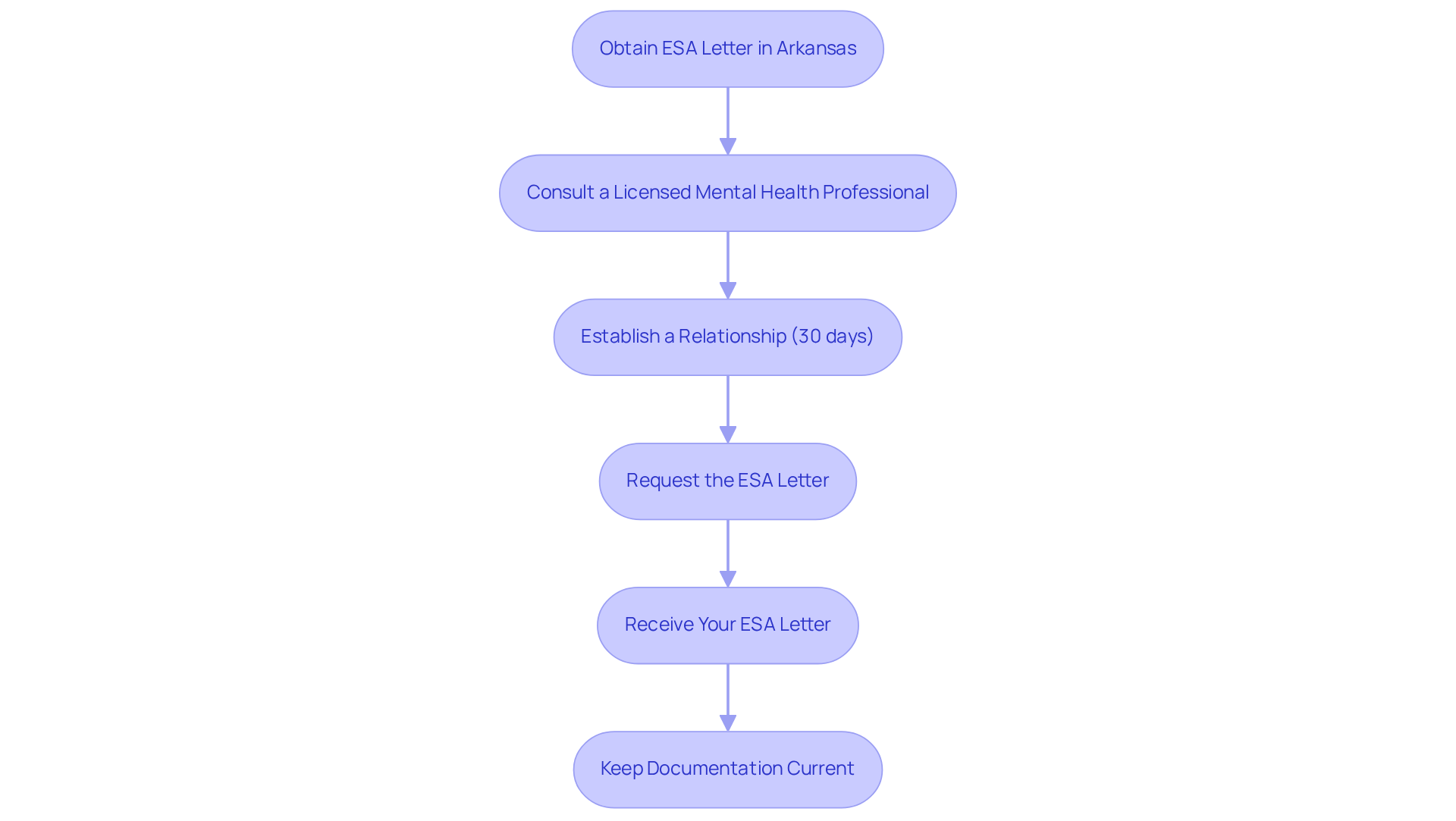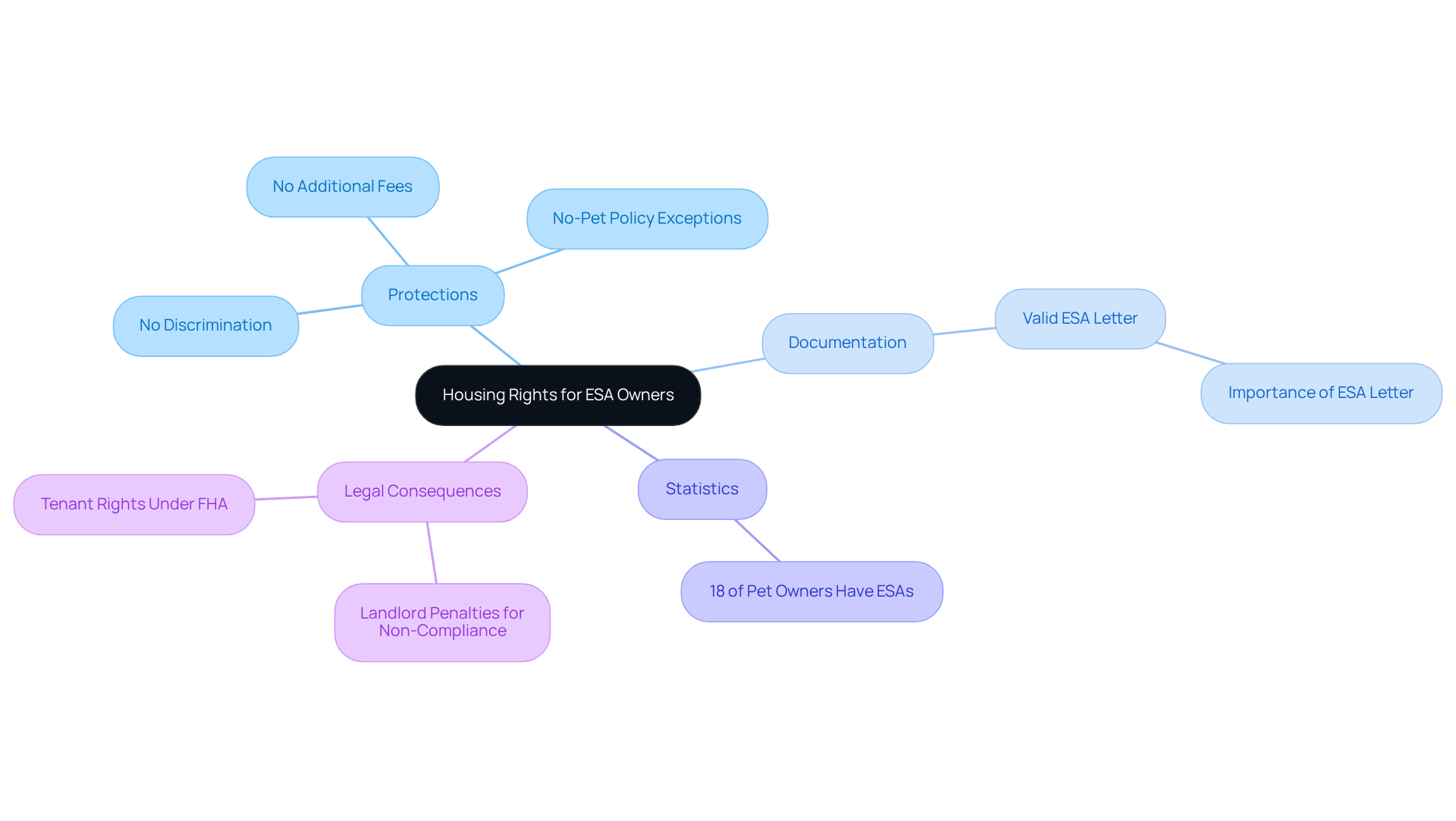

Arkansas Emotional Support Animal: Your Guide to Rights and Process
by Lena Park
Last updated: July 20, 2025
Verified and Approved by:
Angela Morris,
MSW, LCSW
Fact Checked

Overview
This article explores the rights and processes involved in obtaining an Emotional Support Animal (ESA) in Arkansas, shedding light on the important legal distinctions between ESAs and service animals. It recognizes the emotional challenges that individuals may face and emphasizes that while ESAs provide vital emotional support, they are subject to specific regulations.
For instance, a valid ESA letter from a licensed mental health professional is required, and protections under the Fair Housing Act help prevent discrimination against ESA owners in housing situations. This understanding aims to foster a sense of connection and support for those navigating these processes.
Introduction
Navigating the legal landscape surrounding emotional support animals (ESAs) in Arkansas can feel overwhelming for those seeking comfort and companionship during challenging times. Many individuals face emotional struggles that can be difficult to articulate, and the growing recognition of the mental health benefits provided by these animals only adds to the complexity of their legal status and the rights of their owners.
This article compassionately explores the process of obtaining an ESA letter, the housing rights afforded under the Fair Housing Act, and the evolving regulations that shape the experiences of ESA owners in Arkansas.
How can you ensure that your emotional support needs are met and that you feel informed and protected in this journey? Your feelings matter, and there is support available to help you navigate these waters.
Define Emotional Support Animals and Their Legal Status in Arkansas
Emotional Support Animals (ESAs) are defined as beloved companions that provide comfort and emotional assistance to individuals navigating emotional or psychological difficulties. Unlike service animals, which undergo specialized training to perform specific tasks for those with disabilities, emotional support animals do not require such training. In Arkansas, while education savings accounts are recognized under state law, they do not enjoy the same access rights as an Arkansas emotional support animal does under the Americans with Disabilities Act (ADA). Understanding this distinction is crucial for individuals to grasp their rights and the limitations regarding ESA access in public spaces and accommodations.
As we look ahead to 2025, Arkansas has made notable progress in recognizing the importance of education savings accounts, particularly with the passage of Arkansas House Bill 1420. This legislation clarifies that while Arkansas emotional support animals do not possess the same rights as service animals, they are still safeguarded under federal housing laws. Landlords are required to provide reasonable accommodations for tenants with emotional support animals, even in properties with ‘no pets’ policies. This ensures that those grappling with mental health challenges can live alongside their support animals without facing discrimination or additional fees.
Current statistics reveal that around 18% of pet owners in the U.S. have Emotional Support Animals, reflecting an increasing awareness of the mental health benefits they offer. The legal landscape for Arkansas emotional support animals continues to evolve, with updates in 2025 enhancing the rights of owners and underscoring the importance of proper documentation to prevent misuse. This framework ensures that individuals genuinely in need of emotional support can enjoy the benefits of having an ESA while safeguarding the integrity of the system.
Understanding the legal status of emotional support animals is vital for those seeking to navigate accommodation and public access issues. As highlighted in Arkansas House Bill 1420, it is important for ESA owners to recognize that their animals must not pose threats to public safety or breach housing regulations. This careful balance fosters a supportive environment for those who rely on the companionship of their emotional support animals.

Explore Arkansas Laws Governing Emotional Support Animals
In Arkansas, individuals facing mental health challenges often struggle to find the support they need from an Arkansas emotional support animal. The legal structure for Arkansas emotional support animals (ESAs) is primarily outlined by House Bill 1420, which requires a person to establish a minimum 30-day relationship with a licensed mental health professional before an ESA letter can be issued. This regulation is crucial, as it ensures that the mental health needs of individuals are thoughtfully assessed before granting the necessary documentation.
Furthermore, House Bill 1893 allows property owners to impose restrictions on ESAs, as long as these restrictions do not conflict with federal laws like the Fair Housing Act. This emphasizes the vital role of a valid letter for an Arkansas emotional support animal in protecting the rights of ESA owners, particularly concerning housing and travel accommodations.
Emotional Support Animals, such as the Arkansas emotional support animal, provide essential comfort to individuals, especially students with disabilities, by alleviating symptoms associated with their conditions. It’s important to note that letters for an Arkansas emotional support animal must be renewed annually to maintain their validity, a requirement that is common in many states. This renewal process underscores the significance of ongoing mental health support.
Recent changes in Arkansas emotional support animal laws, particularly in 2025, have tightened the requirements for Arkansas emotional support animal documentation to prevent misuse and ensure that only those with legitimate needs can benefit from the protections afforded to ESAs. For instance, case studies reveal that individuals with a valid ESA letter are legally protected against discrimination in residential situations, enabling them to live in Arkansas with their emotional support animals even in places that typically prohibit pets. This legal clarity empowers ESA owners to advocate for their rights effectively, fostering a sense of security and belonging.
As we reflect on these developments, it’s essential to recognize the emotional journey of those seeking support. The presence of an ESA can be transformative, offering not just companionship but also a sense of stability in challenging times. If you or someone you know is navigating these waters, remember that support is available, and you are not alone in this journey.

Outline the Process for Obtaining an ESA Letter in Arkansas
Obtaining an Arkansas emotional support animal letter can feel overwhelming, especially when navigating the complexities of mental health needs. Here’s a compassionate guide to help you through the process:
-
Consult a Licensed Mental Health Professional (LMHP): Begin by scheduling an appointment with a licensed therapist, psychologist, or psychiatrist. This step is crucial, as it allows for an evaluation of your mental health needs, ensuring you receive the support you deserve.
-
Establish a Relationship: In Arkansas, it’s important to build a minimum 30-day relationship with your LMHP. This requirement is designed to ensure that your professional in Arkansas understands your unique mental health condition and can accurately assess your need for an Arkansas emotional support animal.
-
Request the ESA Letter: If your LMHP believes that an ESA would enhance your emotional well-being, you can formally request the ESA letter. This document should clearly outline your need for the animal and be signed by your LMHP, validating its authenticity.
-
Receive Your ESA Letter: Typically, clients receive their official ESA letter within 24 hours after approval, allowing you to access timely support.
-
Keep Documentation Current: It’s essential to renew your ESA letter each year to maintain its validity and comply with rental regulations. This ongoing relationship with your LMHP is vital for continued support and adherence to legal requirements.
Moreover, having a valid Arkansas emotional support animal letter provides protections under the Fair Housing Act, allowing individuals to live with their emotional support animals in pet-restricted accommodations without facing discrimination.
To make this process easier, consider taking our quick assessment at Wellness Wag. We’re here to discuss your situation and emotional support needs. After submitting the necessary forms, we’ll connect you with a licensed medical professional for a personalized consultation and thorough evaluation to assess your eligibility for an ESA. Remember, you’re not alone in this journey; support is available to help you thrive.

Understand Housing Rights for ESA Owners Under the Fair Housing Act
Navigating the complexities of housing can be particularly challenging for individuals with mental health issues. Under the Fair Housing Act (FHA), individuals with an Arkansas emotional support animal are granted essential protections against discrimination in accommodation. It’s heartening to know that landlords cannot deny housing to owners of Arkansas emotional support animals simply because of their pets, even in properties that uphold no-pet policies. This is a crucial safeguard, as it ensures that individuals seeking emotional support are not unfairly burdened by additional fees or deposits for their animals.
To assert these rights, it is important for owners of an Arkansas emotional support animal to present a valid ESA letter to their landlord. This letter serves as a testament to the necessity of the Arkansas emotional support animal for emotional support, reinforcing the bond between the individual and their ESA. While these animals provide invaluable comfort, it is essential to recognize that they differ from service dogs, which are trained to perform specific tasks and enjoy broader legal access under the Americans with Disabilities Act (ADA).
Interestingly, in the U.S., about 18% of pet owners have Arkansas emotional support animals, reflecting a growing acknowledgment of their significance. However, it’s disheartening to note that breaches of these rights do occur. There have been instances where landlords unlawfully charged fees or denied accommodations to tenants holding valid letters for an Arkansas emotional support animal. This is where awareness becomes a powerful ally for ESA owners, ensuring they receive the fair treatment they deserve.
Housing providers are required to respond to a tenant’s request for an Arkansas emotional support animal within 10 days and must engage in good faith efforts to accommodate these animals. It is reassuring to know that landlords can face legal consequences for charging pet fees for Arkansas emotional support animals, reinforcing the protections under the FHA. By understanding these rights, ESA owners can navigate their housing situations with confidence, knowing that support is available to them.

Conclusion
Emotional Support Animals (ESAs) are essential companions, providing emotional stability and comfort for individuals navigating the challenges of mental health. It is crucial to understand the legal framework surrounding ESAs in Arkansas to ensure that those in need can access the support they deserve. Recent legislation, including Arkansas House Bill 1420, outlines specific requirements for obtaining an ESA letter, which is vital for securing housing and other accommodations.
Establishing a relationship with a licensed mental health professional is a key step in this journey, as is obtaining a valid ESA letter. The protections afforded under the Fair Housing Act are significant, offering essential rights to ESA owners. As awareness of ESAs grows in Arkansas, it is important for landlords to recognize their legal obligations to accommodate these individuals. Compliance with state regulations is also necessary to prevent misuse of ESA provisions. By understanding these elements, ESA owners can advocate for their rights and ensure they receive fair treatment in housing situations.
Ultimately, the process of obtaining an emotional support animal and the rights that accompany it transcends legal protections; it is about creating a nurturing environment for mental health. Those navigating this journey are encouraged to seek help, reminding them that they are not alone. By staying informed and advocating for their rights, individuals can foster a more inclusive community where emotional support animals can thrive alongside their owners.
Frequently Asked Questions
What are Emotional Support Animals (ESAs)?
Emotional Support Animals (ESAs) are companions that provide comfort and emotional assistance to individuals dealing with emotional or psychological difficulties. Unlike service animals, ESAs do not require specialized training to perform specific tasks.
What is the legal status of ESAs in Arkansas?
In Arkansas, emotional support animals are recognized under federal housing laws, which require landlords to provide reasonable accommodations for tenants with ESAs, even in properties with ‘no pets’ policies. However, ESAs do not have the same access rights as service animals under the Americans with Disabilities Act (ADA).
What does Arkansas House Bill 1420 entail regarding ESAs?
Arkansas House Bill 1420 clarifies the rights of emotional support animals and their owners, ensuring that while ESAs do not have the same rights as service animals, they are still protected under federal housing laws.
How prevalent are Emotional Support Animals among pet owners in the U.S.?
Current statistics indicate that around 18% of pet owners in the U.S. have Emotional Support Animals, reflecting increasing awareness of their mental health benefits.
What should ESA owners be aware of regarding their animals?
ESA owners should recognize that their animals must not pose threats to public safety or violate housing regulations. Proper documentation is also important to prevent misuse of ESA privileges.
How does the legal framework for ESAs in Arkansas continue to evolve?
The legal framework for emotional support animals in Arkansas is evolving, with updates expected in 2025 that will enhance the rights of owners and emphasize the importance of proper documentation for ESAs.
Certify Your Emotional Support Animal Today

Why You Can Rely on Us?
At Wellness Wag, we believe your pet deserves care rooted in both science and compassion. Each article is carefully researched, written in clear language for pet owners, and then reviewed by qualified professionals to ensure the information is evidence-based, current, and practical for real-life care. Our goal is to help you feel confident in making informed decisions about your pet’s health and well-being.
Reviewed by
Angela Morris, MSW, LCSW
Angela is a licensed clinical social worker with 20 years of experience in patient advocacy and community mental health. She has assisted numerous clients with ESA evaluations and brings a deep understanding of disability accommodations, ensuring that all information is accurate, supportive, and practical.

Written by :
Lena Park
Last Updated :
July 20, 2025












